text ©2010
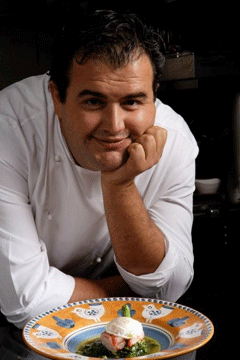
Chef Gennaro Esposito
An Aries, Gennaro Esposito was born 37 years ago at Vico Equense, a charming if chaotic town on the breathtakingly beautiful Amalfi Coast. There were two determining moments in his professional formation: an internship with Gianfranco Vissani, Italy’s top chef most frequently in the limelight, and a coincidental encounter with Alain Ducasse during one of the many times “il maestro” had come to Positano on vacation. Before he knew it, Eposito found himself in Ducasse’s kitchens of the Louis XV restaurant in Montecarlo and of the Plaza Athénée Hotel in Paris. “In both,” he likes to tell, “I learned the exact meaning of perfectionism and of fanatic attention to detail.”
Back in his beloved home region in 1992, with his wife Vittoria, who is the pastry chef and in-charge of the dining room, he opened “La Torre del Saracino” (Via Torretta 19, Marina d’Equa, just outside Vico Equense, tel. 081-8028555,www.torredelsaracino.it) with its mind-boggling view over the Bay of Naples. It boasts several professional recognitions: a first Michelin star in 2001; the second in 2008,Gambero Rosso’s three forks since 2003, and L’Espresso’s acknowledgement as the best restaurant in Campania since 2006.
At the gala evening during the 9th “International Pasta Festival”, renamed “Pasta’s Five Senses,” which took place from the 11th to the 13th of September, 2009, in the nearby town of Gragnano, world famous as “the capital of pasta,” host Esposito talked about his passion for cuisine with Lucy Gordan, a guest of the municipality and Epicurean-Traveler.com’s Rome Bureau Chief.
Our tastes in food are closely connected to our childhood — your first memories of food?
GE: I was truly fortunate to have a mother who taught me all about genuine food products and our traditional regional cuisine. She and her father were tenant farmers, so in our house I grew up knowing the importance of organic foods. It was our way of life to eat seasonal fruits and vegetables, those cultivated without pesticides. These experiences are still of the upmost importance to me when I’m inventing a menu because I always put these concepts and flavors in my new dishes.
Was there a dish that you couldn’t wait to eat when you woke up in the morning or when you came home from school?
EG: All the traditional dishes from Campania, but in particular Il migliaccio with semolina cooked in milk.
Have there been other chefs in your family?
EG: No, but my mother is a superb cook. One of my uncles, the husband of one of my mother’s sisters, is a pastry chef. I began working in his shop when I was nine years old. It was thanks to this experience that I chose “to remain in the kitchen.”
You did internships with Vissani and Ducasse, right?
EG: Yes, they were both key experiences.
In the profile you wrote about yourself on your website (www.torredelsaracino.it) you say that you learned a lot from Vissani thanks both to his personal warmth and his erratic temperament. A comment or two about Vissani, please. What did you learn from him?
EG: In a restaurant kitchen it’s necessary to be meticulous and self-disciplined. This strictness helps concentration and obliges a definite rhythm and a set of rules. It’s very important for a mentor to transmit this type of self-discipline. In the past our professional ambiance was stricter, more inflexible and, without a doubt, more hierarchal than today. From Vissani I learned to use many unconventional ingredients. He broadened my awareness of ingredients and my skills. He also taught me that creativity combined with familiarity and skillfulness knows no limits in the kitchen, that I could create combinations unthought-of until then which would give my future guests unique experiences. That was my goal then and it still is.
What did you learn from Ducasse?
EG: He helped me to discover and understand the world of French cuisine. Up to then I only knew what I’d read in books or had heard through the grapevine. What’s particularly special about Ducasse is that he’s like a teacher during the Renaissance in that he brings out the aptitudes of his interns. He doesn’t impose his style; he proposes it very subtly but incisively. He encourages and supports his interns’ abilities through his wide experience. Ducasse was capable of creating “a school,” a following, disciples. This has allowed him to open top-notch restaurants all over the world. I was especially moved by his love for Mediterranean cuisine which he enriches with the grand tradition and competence of French cuisine. Moreover I admire his self-discipline in continuing to propose classic French cuisine at his restaurant in Paris, whereas his menu at “Spoon” in Saint Tropez is Mediterranean. Ducasse is a chef without culinary boundaries. He’s a genius at interpreting non-French cuisines. This ability mirrors his enormous curiosity and his respect for all things culinary.
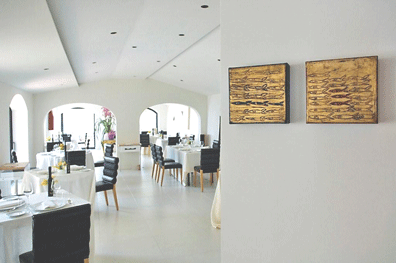
Interior of Esposito
Was there a particular moment, episode when you understood that being a chef was your vocation?
EG: While I was working in my uncle’s pastry shop, but, as I’ve already said, I’ve always loved food. I owe this to my mother. Probably even when she was still nursing me, she transmitted a love of food. In the pastry shop, when I realized that by combining two flavors, I’d created a sublime third, this alchemy, this artisanry, this skill hooked me forever.
Where did you begin to work in a restaurant kitchen and not in a pastry shop?
EG: In a very simple, local pizzeria. I was fourteen.
What are the essential qualities of being a top chef?
GE: Most importantly, I think that today top chefs must be cultured. They have to have time to expand their general knowledge, to learn more about local cuisine and food products and to invent their very own style. Secondly, they have to be creative, but must also have a solid base in traditional cuisine on which to build this creativity. Thirdly, they must know how to motivate and stimulate their staff, their team, and must be able to transmit their passion for this profession especially to the young collaborators, those who are just starting out, beginning to make enormous sacrifices for their ideal, their ambitious goal. It’s fundamental that a young person starting out in this professional should feel like a key part of the team, of the project. Fourthly, they must talk to their guests to learn which dishes they like and which they don’t.
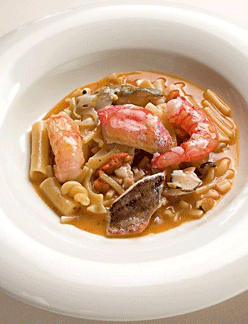
Esposito’s Seafood Stew
What do you like best about your profession?
GE: The difference of today from yesterday and from tomorrow: different dishes, colors, flavors, clients make this profession a constant challenge and successfully ward off the boredom of a routine.
The least?
GE: Cooking for guests who lack curiosity, who don’t want to discover anything unfamiliar.
In a nutshell, what is your culinary philosophy? Is it still “Cook for others as you would like others to cook for you”?
GE: Yes. In addition, only use the highest quality products and respect their seasonality; as well as to keep to tight and strong professional ethics.
How would you define your cuisine in a slogan?
GE: Straightforward and simple. Thanks to my meticulous care every ingredient I use and every dish I prepare is special and unique.
What are your signature dishes?
GE: To tell you the truth, I don’t like to highlight one dish over the others. I like to think that each and every one of my dishes has its personality, its characteristics. Inevitably some of my dishes are more popular with the public than others. This is true for every chef. Nonetheless, out of respect for all the dishes that I create, I refuse to designate one as MY specialty.
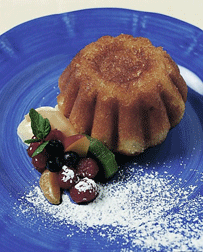
Esposito’s upside-down cake
What do you believe is the reason for your success?
GE: You should ask that question of others, not of me. However, maybe my success is due to my constant hard work, my honesty, my loyalty to my clients, to my team, some of whom have been working with me since 1992 when we opened, to some of my suppliers, and to my good fortune to live in such a beautiful place with so many delicious food products to choose from and with a great culinary tradition.
What professional recognition has given you the most personal satisfaction?
EG: My participation since 1999 in the association called “Jeunes Restaurateurs d’Europe.” It has allowed me to get to know young colleagues from all over Europe and to understand that borders and “geographic palates” are chauvinistic.
What are your feelings about food critics and restaurant guides? Have they been a help to your career, or have they added stress?
GE: Guides have helped me enormously. As you know, it’s difficult to find “Torre del Saracino.” Lots of people come here the first time because they’ve read about us in a guidebook.
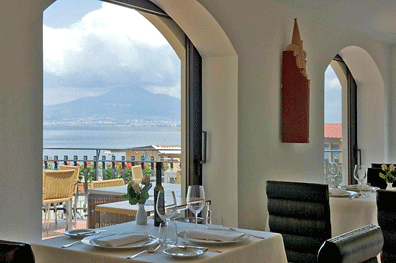
A View of Vesuvius across the bay from Esposito
Up to now you have told me about Gennaro Esposito the chef, but my readers and I would like to know more about you. For example, what is your favorite food?
GE: My mother’smigliaccio and pizza, classic, old-fashioned Neapolitan pizza, la marinara or la margherita. To tell you the truth, I love all cuisine that has a history, a concept, a philosophy behind it. If I pick one dish, I’m snubbing the other 10,000 that I like. I’m a gourmet.
Your favorite wine?
GE: All Burgundies, especially Pinot Noir. French wines are more inviting than Italians. My favorite Italian wines are full-bodied reds: Barolo, Barbaresco, Sangiovese, Brunello made from native grapes. I much prefer red to white wines, although at the moment I’m spell-bound by champagne.
Flower?
GE: All wild flowers and blue hydrangeas.
Color?
GE: The colors of the sea in all their various shades.
.
A dish you don’t like?
GE: Margarine and all badly-prepared dishes.
Chefs are well-known for having collections, often of motorcycles, fast cars, or watches; what about you?
GE: I don’t have time for hobbies or collections, at least up to now. I love music and I have lots of records of music “from my lifetime” you could say. By that I mean music of the ‘70s, ‘80s etc. etc.: Rock, The Rolling Stones, Lead Zeppelin, music with its roots in social protest…
Have you written a cookbook?
GE: Not yet.
Besides Vissani and Ducasse, other chefs you admire?
GE: Gualtiero Marchesi, Aimo Moroni and his wife Nadia, and Ferran Adria, but to single out names, to remember to mention everyone, is much too ambitious a project. When we opened “Torre del Saracino,” almost all the top Italian chefs worked north of here. Nearby the only top chef/restaurateur was Don Alfonso Iaccarino. Therefore almost all my possible mentors lived very far away so I had to travel a great deal. My goal was and remains to run a restaurant where my guests can enjoy my top cuisine and my personal welcome.
If they hadn’t become chefs, Heinz Beck wanted to be a painter; Gualtiero Marchesi a pianist; Thomas Keller the shortstop for the New York Yankees; Vítor Sobral a judge; and Léa Linster an actress; what about you?
GE: A musician or a DJ. The ability to play a musical instrument is a special gift. I admire all musicians.
& & &
Lucy Gordan is an award-winnning travel writer and cultural journalist living in Rome, where she is Epicurean-Traveler.com’s Bureau Chief. She can be reached at gordan@attglobal.net. Her website iswww.lucygordan.com.
